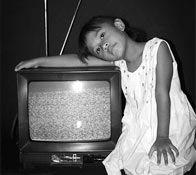TV Delays Child’s Language Development
 Parents who have babies should cut down on watching TV because it’s bad for the language development in their babies, recent study says. With the TV turned on, parents talk to their babies less, so babies get worse at acquiring speaking skills.
Parents who have babies should cut down on watching TV because it’s bad for the language development in their babies, recent study says. With the TV turned on, parents talk to their babies less, so babies get worse at acquiring speaking skills.
Researches studied how the TV influences the babies aged from two months to four years old and found that every extra hour of a TV turned on slashed the number of words the parents told to their babies by 500-1000.
According to the Centre for Child Health, Behavior and Development in Seattle, the more the TV is on, babies vocalize less and their parents also speak to them more infrequently. The researches say that the results of the study could explain the link between regular exposure to television and delays in a child’s language development established during the previous studies.
The experiment involved 329 children who wore a small recorder on random days monthly for up to two years that recorded everything they said or heard. Then, the records were processed by a special speech identification software to analyze the number of words uttered by babies and their parents as well as to detect engagement in conversations.
The author of the study Dimitri Christakis claims that television is negative for a baby speech because parents tend to leave their babies alone sitting in front of a TV. Also, even if parents are around, the TV lures their attention away from focusing on conversations, which hampers speech development in their children. “Since 30% of American households now report having the television always on, even when no one is watching, these findings have grave implications for language acquisition and therefore perhaps even early brain development,” concludes Christakis.
The results of the studies were published in Archives of Paediatrics & Adolescent Medicine Journal.
Source of the image: flickr.com/photos/poetry2capullet.
